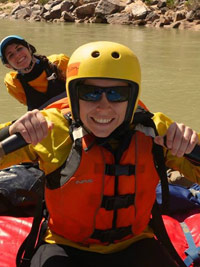Student Spotlight: Soils and Biogeochemistry Graduate Student Hannah Waterhouse
This feature originally appeared on the UC Davis Department of Land, Air and Water Resources website.

Hannah Waterhouse
Class Level: Graduate Student
Major: Soils and Biogeochemistry
Why did you select this major?
I find most people I run into in the Soils and Biogeochemistry Graduate Group have arrived in this field in a very circuitous route. I’m definitely no exception. I did my undergraduate degree in Mathematics and wasn’t even aware of what a career in soil science would look like. My 2nd year of college I ended up adding a geology minor and had a professor who taught an intro to soil science class. It was this class combined with growing up gardening with my dad, playing on the farms surrounding my aunt’s house in England, WOOFING near Yosemite, and managing an urban farm in Wilmington, Delaware that I found myself landing a job as a research assistant in a soils lab at the University of Delaware. I came into the field by way of my interest in food production and food systems, and discovered that soil science is a lens through which we can better understand, integrate, and apply all branches of the physical sciences. And it makes biology, chemistry, and physics a lot more fun when you can get your hands dirty.
Favorite course(s) and why?
The Soil Field Course was one of my favorite classes. Taxonomy of any kind can be a little dry but this course brought soil taxonomy and genesis to life by contextualizing it on the landscape, in geologic time, and in terms of land management. Not only did I get to have fun with and get to better know my cohort, we got to see the diversity California has in terms of soils, land use, and pedogenic environments – making it one of the most interesting places to explore soil morphology.
Best college experience so far?
There are many but if I have to choose a few…UC Davis’s integrated and interdisciplinary graduate group infrastructure allows for a plethora of opportunities. I was able to participate in the USAID Trellis Fellowship administered through HortCRSP and travel to Bangladesh to work with female subsistence farmers on salt affected soils. This opportunity allowed me to apply my knowledge of soils to addressing the intersection of climate change and food security while learning how to effectively work across cultural differences. I would be remised not to mention the Ecogeomorphology class where we got to raft down the Grand Canyon. This was by far one of the most incredibly epic adventures I’ve ever had. It had nothing to do with my research (sorry if you’re reading this Will) but it was a once in a lifetime opportunity that UC Davis offers to students. Because the class is so interdisciplinary I learned from my colleagues on topics ranging from invasive species ecology to Native American history to reading earth’s history through the geology of the canyon. The trip reaffirmed what incredible people Davis attracts.
Extra-curricular activities?
All the sports! Our graduate group has a couple of IM teams that I really enjoy playing on including soccer and Frisbee.
Your advice to new students in this major?
Get involved in activities other than your research – you’ll be happily surprised by the connections you make with your colleagues and the potential opportunities and collaborations that come from it. Not only will it make your resume stand out it will broaden and enrich your graduate experience.
What are your long-term goals and how do they relate to this major?
I love asking questions and learning – research has definitely fueled my curiosity. I would definitely like to keep doing research but also bridge the gap between stakeholders and research. I’m still early in my career and open to many opportunities but I find I’m happiest when I am engaging people – whether that be with undergraduates, farmers, or policy makers. I think we need more people with a strong foundation in science to help effectively guide policy decisions that effect our environment, food systems, and community.
Do you have any additional comments regarding your experience as an LAWR student?
Graduate school is an exercise in tenacity. The struggle, frustration, and mistakes are part of the process. Resist the compulsion to compare yourself to others – everyone starts at different places and this is your own individual journey. It’s more productive to reflect on where you are now compared to 1,3, 5 years ago.